Alan: I am reluctant to post the following article.
Wilson flirts recklessly with a vision of randomness that does not account for the teleological premise of his throwaway line: "The unfolding of history is obedient only to the general laws of the Universe."
"Only!"
Only to "The General Laws?!?"
These General Laws are not "only..."
Rather, they are so toweringly important that they recall C.S. Lewis' speculation that "macroscopic beings" exist but are so big they cannot be seen.
Not only does Wilson's personal cheerfulness suggest that "innate purposiveness " is, by nature, a "good fit" for homo sapiens, so do his words.
In the quotation above, it is absurd to say that "the world needs all you can give" if randomness is fundamental.
You don't "need" to do anything. Over the course of eons, randomness will do "it" even if you don't. (Admittedly, we can - and perhaps "should" - propose that "consciousness," "purpose" and "human social life" are components of a "Higher Order of Being" than non-human evolution, but that's another story.)
Absent "something" more than overarching randomness, Reality does not - and can not - impose any teleologically-driven "need" on humankind.
We can pretend that such "need" is there.
Philosophical Utilitarianism can argue such "need" is pragmatically advisable.
But Wilson cannot be consistent with his own "random" credo and contend that "the world needs all you can give."
In a completely random Universe (which I see as impossible since "general laws" of a non-statistical nature exist) there is no philosophical predicate for the "world needing all you can give" unless there is an a priori introduction of the very teleology that randomness (as commonly considered) precludes.
I suggest the Universe is so unfathomably majestic that Total Randomness operates as a subset of the law-abiding "Whole," a "Whole" that is always "greater than the sum of its parts."
Furthermore, the "whole" is incomprehensibly "greater than the sum of its parts."
Trying to wrap our minds around it is like trying to use our teeth to bite our teeth.
On the other side of "the Higgs boson" --- "before" Universe-Spirit imparted mass to un-mass --- is the a priori "given" that Life must be significantly random -- significantly unpredictable -- if it is to survive, much less thrive.
The political and philosophical predicate that demonstrates the "un-livability" of totally predetermined Life is that, politically, psychologically and socially, "authoritarian absolutism is so noose-taut that it ends by strangling itself."
At bottom, "the other side" of "Higgs" is lawful.
And "the other side of Higgs" communicates that lawfulness to this side of "Higgs."
But within that ontological lawfulness is a "statistical subset" of Law that opens upon unforeseen possibilities, possibilities that are ultimately ruled by pre-existent (i.e., pre-Higgs) non-statistical laws.
It is, for example, a fundamental, incontrovertible fact that gravity exists.
Like the other fundamental laws of physics, gravity is not a statistical probability.
Wilson flirts recklessly with a vision of randomness that does not account for the teleological premise of his throwaway line: "The unfolding of history is obedient only to the general laws of the Universe."
"Only!"
Only to "The General Laws?!?"
These General Laws are not "only..."
Rather, they are so toweringly important that they recall C.S. Lewis' speculation that "macroscopic beings" exist but are so big they cannot be seen.
Not only does Wilson's personal cheerfulness suggest that "innate purposiveness " is, by nature, a "good fit" for homo sapiens, so do his words.
In the quotation above, it is absurd to say that "the world needs all you can give" if randomness is fundamental.
You don't "need" to do anything. Over the course of eons, randomness will do "it" even if you don't. (Admittedly, we can - and perhaps "should" - propose that "consciousness," "purpose" and "human social life" are components of a "Higher Order of Being" than non-human evolution, but that's another story.)
Absent "something" more than overarching randomness, Reality does not - and can not - impose any teleologically-driven "need" on humankind.
We can pretend that such "need" is there.
Philosophical Utilitarianism can argue such "need" is pragmatically advisable.
But Wilson cannot be consistent with his own "random" credo and contend that "the world needs all you can give."
In a completely random Universe (which I see as impossible since "general laws" of a non-statistical nature exist) there is no philosophical predicate for the "world needing all you can give" unless there is an a priori introduction of the very teleology that randomness (as commonly considered) precludes.
I suggest the Universe is so unfathomably majestic that Total Randomness operates as a subset of the law-abiding "Whole," a "Whole" that is always "greater than the sum of its parts."
Furthermore, the "whole" is incomprehensibly "greater than the sum of its parts."
Trying to wrap our minds around it is like trying to use our teeth to bite our teeth.
On the other side of "the Higgs boson" --- "before" Universe-Spirit imparted mass to un-mass --- is the a priori "given" that Life must be significantly random -- significantly unpredictable -- if it is to survive, much less thrive.
The political and philosophical predicate that demonstrates the "un-livability" of totally predetermined Life is that, politically, psychologically and socially, "authoritarian absolutism is so noose-taut that it ends by strangling itself."
At bottom, "the other side" of "Higgs" is lawful.
And "the other side of Higgs" communicates that lawfulness to this side of "Higgs."
But within that ontological lawfulness is a "statistical subset" of Law that opens upon unforeseen possibilities, possibilities that are ultimately ruled by pre-existent (i.e., pre-Higgs) non-statistical laws.
It is, for example, a fundamental, incontrovertible fact that gravity exists.
Like the other fundamental laws of physics, gravity is not a statistical probability.
E.O. Wilson on the Meaning of Human Existence and the Meaning of “Meaning”
by Maria Popova
“The most successful scientist thinks like a poet … and works like a bookkeeper.”
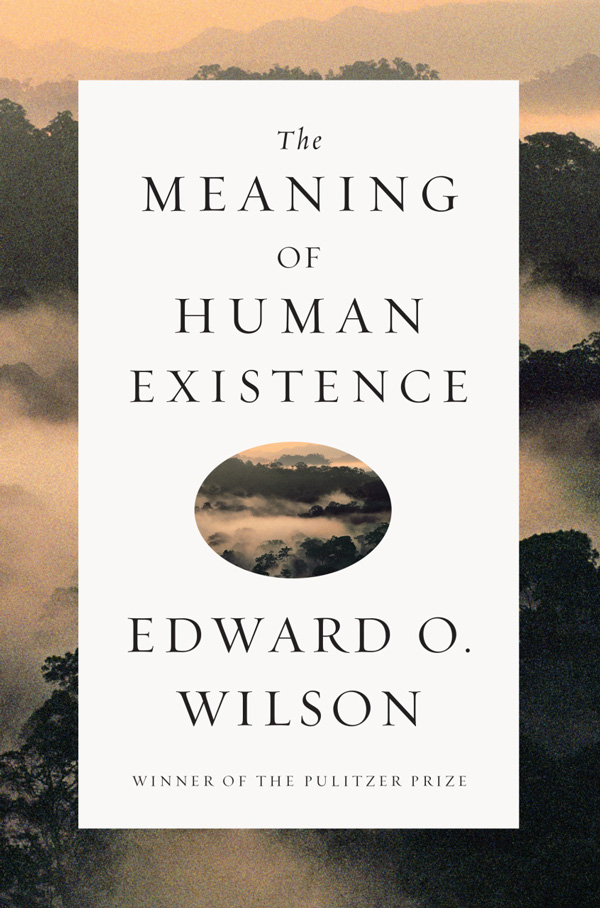 Just as the fracturing of our inner wholeness ruptures the soul, a similar fissure rips society asunder and has been for centuries — that between science and the humanities. The former explores how we became human and the latter what it means to be human — a difference at once subtle and monumental, polarizing enough to hinder the answering of both questions. That’s what legendary naturalist, sociobiologist, and Pulitzer-winning writer E.O. Wilson explores with great eloquence and intellectual elegance in The Meaning of Human Existence (public library).
Just as the fracturing of our inner wholeness ruptures the soul, a similar fissure rips society asunder and has been for centuries — that between science and the humanities. The former explores how we became human and the latter what it means to be human — a difference at once subtle and monumental, polarizing enough to hinder the answering of both questions. That’s what legendary naturalist, sociobiologist, and Pulitzer-winning writer E.O. Wilson explores with great eloquence and intellectual elegance in The Meaning of Human Existence (public library).
Three decades after Carl Sagan asserted that “if we ever reach the point where we think we thoroughly understand who we are and where we came from, we will have failed,” Wilson — a longtime proponentof bridging the artificial divide between science and the humanities — counters that “we’ve learned enough about the Universe and ourselves to ask these questions in an answerable, testable form.”
And that elusive answer, he argues, has to do with precisely that notion of meaning:
In ordinary usage the word “meaning” implies intention, intention implies design, and design implies a designer. Any entity, any process, or definition of any word itself is put into play as a result of an intended consequence in the mind of the designer. This is the heart of the philosophical worldview of organized religions, and in particular their creation stories. Humanity, it assumes, exists for a purpose. Individuals have a purpose in being on Earth. Both humanity and individuals have meaning.There is a second, broader way the word “meaning” is used and a very different worldview implied. It is that the accidents of history, not the intentions of a designer, are the source of meaning. There is no advance design, but instead overlapping networks of physical cause and effect. The unfolding of history is obedient only to the general laws of the Universe. Each event is random yet alters the probability of later events. During organic evolution, for example, the origin of one adaptation by natural selection makes the origin of certain other adaptations more likely. This concept of meaning, insofar as it illuminates humanity and the rest of life, is the worldview of science.Whether in the cosmos or in the human condition, the second, more inclusive meaning exists in the evolution of present-day reality amid countless other possible realities.
The idea that we are a cosmic accident is far from new and, to the unexamined existential reflex, far from comforting. And yet, Wilson suggests, there is something enormously gladdening about the notion that out of all possible scenarios, out of the myriad other combinations that would have resulted in not-us, we emerged and made life meaningful. He illustrates this sense of “meaning” with the particular evolutionary miracle of the human brain, the expansion of which was among the most rapid bursts of complex tissue evolution in the known history of the universe:
A spider spinning its web intends, whether conscious of the outcome or not, to catch a fly. That is the meaning of the web. The human brain evolved under the same regimen as the spider’s web. Every decision made by a human being has meaning in the first, intentional sense. But the capacity to decide, and how and why the capacity came into being, and the consequences that followed, are the broader, science-based meaning of human existence.Premier among the consequences is the capacity to imagine possible futures, and to plan and choose among them. How wisely we use this uniquely human ability depends on the accuracy of our self-understanding. The question of greatest relevant interest is how and why we are the way we are and, from that, the meaning of our many competing visions of the future.
Perched on the precipice of an era when the very question of what it means to be human is continually challenged, we stand to gain that much more from the fruitful cross-pollination of science and the humanities in planting the seeds for the best such possible futures. Like an Emerson of our technoscientific era, Wilson champions the ennobling self-reliance embedded in this proposition:
Humanity … arose entirely on its own through an accumulated series of events during evolution. We are not predestined to reach any goal, nor are we answerable to any power but our own. Only wisdom based on self-understanding, not piety, will save us.
That self-understanding, he cautions, necessarily requires both science and the humanities:
This task of understanding humanity is too important and too daunting to leave exclusively to the humanities. Their many branches, from philosophy to law to history and the creative arts, have described the particularities of human nature back and forth in endless permutations, albeit laced with genius and in exquisite detail. But they have not explained why we possess our special nature and not some other, out of a vast number of conceivable natures. In that sense, the humanities have not achieved nor will they ever achieve a full understanding of the meaning of our species’ existence.
The key to the great mystery of just what we are, Wilson argues, lies in “the circumstance and process that created our species,” which span millions of years of evolutionary history, long transcending the timeline of human civilization and “culture” — the substance of the humanities. Indeed, the very forces of natural selection that shaped our evolution are now gradually being replaced by a kind of “volitional selection” — directly, as we set out to redesign our biology and mold human nature to our wishes, and indirectly, by the biosociologically homogenizing effects of such forces as the global flux of emigration (I imported my own Eastern European genes into the American population pool) and the rise in interracial marriages (my best friend’s daughters are the glorious fusion of her own Korean heritage and her husband’s Irish-French-Lebanese genetic ancestry). Wilson writes:
The human condition is a product of history — not just the six millennia of civilization but very much further back, across hundreds of millennia. The whole of it, biological and cultural evolution, must be explored in seamless unity for a complete answer to the mystery.[...]The time has come to consider what science might give to the humanities and the humanities to science in a common search for a more solidly grounded answer than before to the great riddle of our existence.
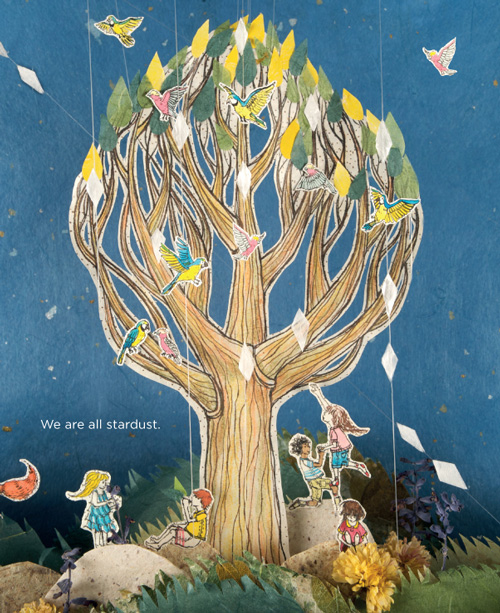
Illustration from 'You Are Stardust' by writer Elin Kelsey and artist Soyeon Kim. Click image for more.
One of Wilson’s most intriguing forays into the riddle has to do with the notion of good and evil in human nature, the perennial question at the heart of Tolstoy and Gandhi’s little-known correspondence and Richard Feynman’s contemplation. Wilson writes:
Are human beings intrinsically good but corruptible by the forces of evil, or the reverse, innately sinful yet redeemable by the forces of good?[...]We are all genetic chimeras, at once saints and sinners, champions of the truth and hypocrites — not because humanity has failed to reach some foreordained religious or ideological ideal, but because of the way our species originated across millions of years of biological evolution.
He illustrates our dual natures with a wonderfully vulnerable and self-aware personal anecdote:
When Carl Sagan won the Pulitzer Prize for nonfiction in 1978, I dismissed it as a minor achievement for a scientist, scarcely worth listing. When I won the same prize the following year, it wondrously became a major literary award of which scientists should take special note.
Much of that duality, Wilson argues, is rooted in the eternal conflict between the two facets of the evolutionary force that shaped us — the individual and group levels of natural selection. He examines our “overpowering instinctual urge to belong to groups” and how it relates to our profound unease with solitude:
To be kept forcibly in solitude is to be kept in pain, and put on the road to madness. A person’s membership in his group — his tribe — is a large part of his identity. It also confers upon him to some degree or other a sense of superiority. When psychologists selected teams at random from a population of volunteers to compete in simple games, members of each team soon came to think of members of other teams as less able and trustworthy, even when the participants knew they had been selected at random.
The dark underbelly of this tendency is at the root of most bigotry — our tendency to judge and reject those who don’t fit the parameters of some tribe we feel we belong to. (Wilson, who grew up in the deeply racist Deep South in the 1930s and began his professional career during the sexist 1950s, brings to these scientific insights his profoundly human experience of having witnessed such group-selection-driven injustices in action.) Understanding the various levels on which natural selection operates, Wilson argues, is the key to understanding ourselves as a species and as individual moral agents:
Within groups selfish individuals beat altruistic individuals, but groups of altruists beat groups of selfish individuals. Or, risking oversimplification, individual selection promoted sin, while group selection promoted virtue. So it came to pass that humans are forever conflicted by their prehistory of multilevel selection. They are suspended in unstable and constantly changing positions between the two extreme forces that created us. We are unlikely to yield completely to either force as the ideal solution to our social and political turmoil. To give in completely to the instinctual urgings born from individual selection would be to dissolve society. At the opposite extreme, to surrender to the urgings from group selection would turn us into angelic robots — the outsized equivalents of ants.
More than a century after Nietzsche’s case for the creative value of turmoil and decades after Anaïs Nin’s memorable assertion that “great art was born of great terrors, great loneliness, great inhibitions,” Wilson argues that “a large part of human creativity is generated by the inevitable and necessary conflict between the individual and group levels of natural selection” and returns to the chance-nature of our nature:
The eternal conflict is not God’s test of humanity. It is not a machination of Satan. It is just the way things worked out. The conflict might be the only way in the entire Universe that human-level intelligence and social organization can evolve. We will find a way eventually to live with our inborn turmoil, and perhaps find pleasure in viewing it as the primary source of our creativity.
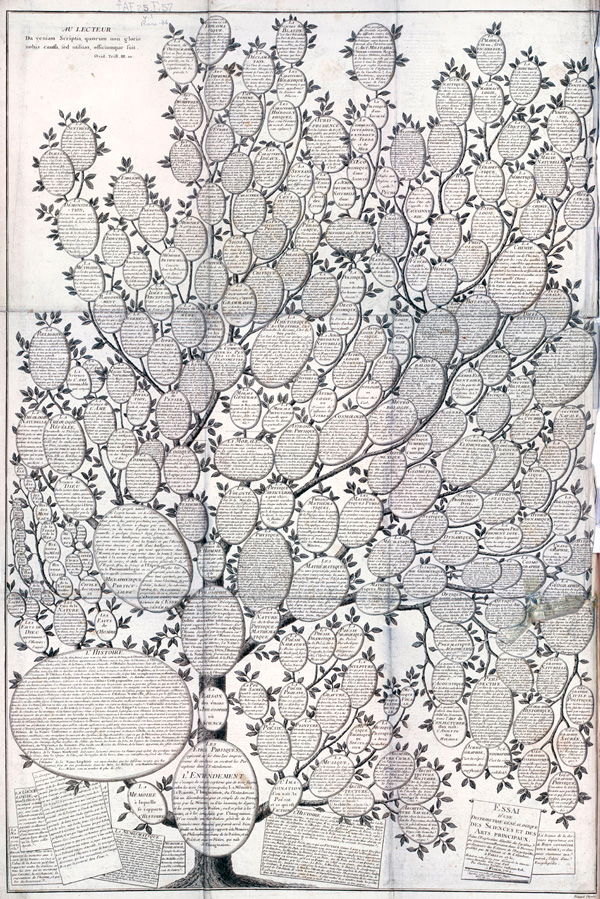
'Genealogical distribution of the arts and sciences' by Chrétien Frederic Guillaume Roth, 1780, from 'The Book of Trees' by Manuel Lima. Click image for more.
That pleasure, Wilson suggests, is to be found in reconciling science and the humanities — two branches of knowledge that, despite their differences, “have risen from the same wellspring of creative thought.” Reflecting on the Enlightenment’s legacy, he considers the vitalizing value of reviving the quest for unification of science and the humanities and argues that it must begin with how we design education:
Studying the relation between science and the humanities should be at the heart of liberal education everywhere, for students of science and the humanities alike.
And yet the great enemy of that unification, specialization — something the quintessential polymath-generalist Buckminster Fuller vehemently opposed — is still king in how the education system structures its priorities. Wilson, a longtime Harvard professor, points to the revered university’s policy of seeking out faculty with “preeminence or the promise of preeminence in a specialty” and wryly laments the illusion that “the assembly of a sufficient number of such world-class specialists would somehow coalesce into an intellectual superorganism attractive to both students and financial backers.” With this, Wilson arrives at the crux of the matter:
The early stages of a creative thought, the ones that count, do not arise from jigsaw puzzles of specialization. The most successful scientist thinks like a poet — wide-ranging, sometimes fantastical — and works like a bookkeeper. It is the latter role that the world sees. When writing a report for a technical journal or speaking at a conference of fellow specialists, the scientist avoids metaphor. He is careful never to be accused of rhetoric or poetry… The language of the author must at all times be restrained and obedient to logic based on demonstrable fact.The exact opposite is the case in poetry and the other creative arts. There metaphor is everything. The creative writer, composer, or visual artist conveys, often obliquely by abstraction or deliberate distortion, his own perceptions and the feelings he hopes to evoke — about something, about anything, real or imagined. He seeks to bring forth in an original way some truth or other about the human experience. He tries to pass what he creates directly along the channel of human experience, from his mind to your mind. His work is judged by the power and beauty of its metaphors. He obeys a dictum ascribed to Picasso: art is the lie that shows us the truth.
For all his timeless wisdom and unassailable genius, Wilson’s only point of datedness shows in his use of pronouns, an inherited linguistic tick burdened by a previous era’s bigotry — must the scientist or the poet always be a “he”? Somewhere, Leonard Shlain is smiling wistfully. But Wilson’s essential quest remains a noble one — to bridge our two most potent sensemaking mechanisms, science and the humanities, and fuse them into a more intelligent and inspired understanding of ourselves, our place in the world, and our best possible future.
In the remainder of The Meaning of Human Existence, he goes on to explore such facets of the quest as the power of instinct, the role of religion, the drivers of social evolution, and why microbes rule the world. Complement it with Dorion Sagan on why science and philosophy need each other and Manuel Lima’s visual history of mapping science and the humanities.

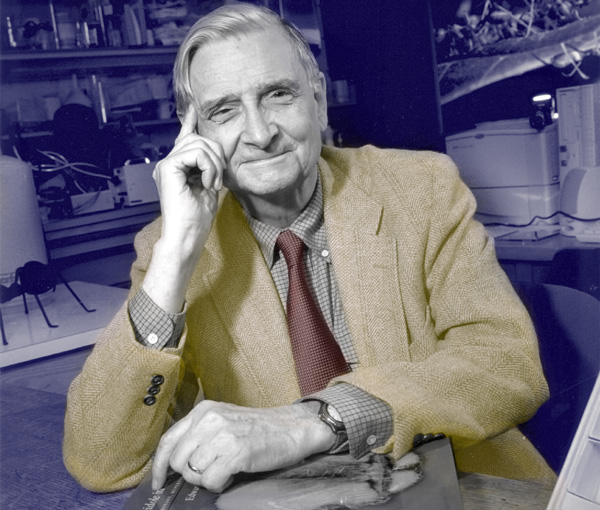
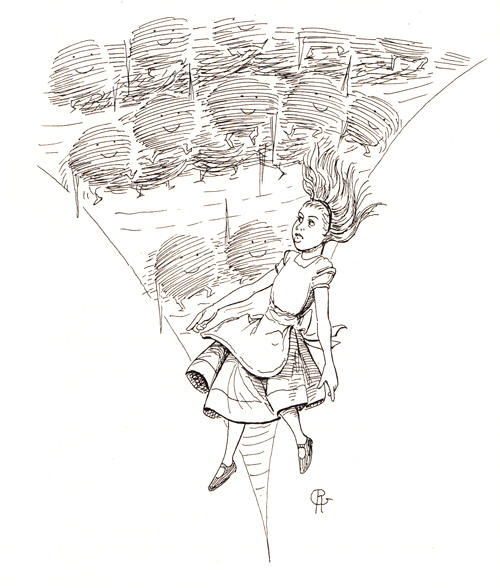
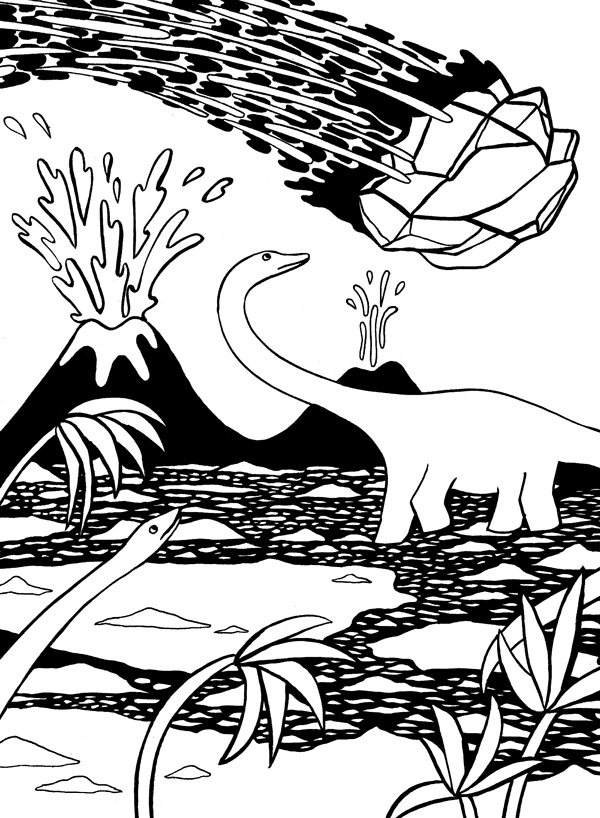
No comments:
Post a Comment